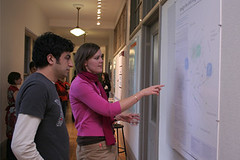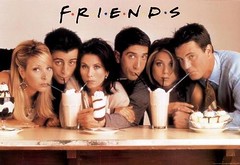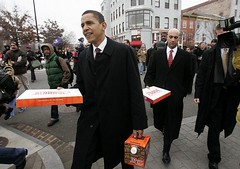The (Planner) Kids in America
From the 1981 song Kids in America by Kim Wilde :
We're the kids in America.
We're the kids in America.
Everybody live for the music-go-round.
Come closer, honey that's better.
Got to get a brand new experience.
Feeling right. Oh don't try to stop baby. Hold me tight.
Outside a new day is dawning.
Outside Suburbia's sprawling everywhere.
I don't want to go baby.
New York to East California.
There's a new wave coming I warn you.

Second Year Masters Students Present Thesis Project Posters at Carnegie-Mellon University.
Yesterday there were two conferences on planning, one was sponsored by the American Planning Association since it was the 100th anniversary to the day of the first organizing meeting of the profession, the other, Urban Nexus, was sponsored by the journal, Next American City, which is fair to say focuses on urban issues as seen through the eyes of younger age cohorts." In both venues, there was a focus on youth and planning for the future.
One presenter at the APA event was particularly irritating, because she believes that all the creative thinking pro-city types are young. And that those of us pushing eligibility for AARP membership are all driving cars, fighting energy conservation, and think greening and sustainability issues are fads. Probably we don't believe in local food systems and the peak oil hypothesis either. And we likely favor tax deductibility for automobiles and continued military intervention overseas, to maintain access to relatively cheap oil, low gasoline taxes, and not funding transit...
Watching reruns of the Friends television show doesn't make you an expert on cities, even if it encourages you to give the city a chance.

Very irritating. (Note that at the APA event, of all the speakers, including the keynote about Bogota by Colombia's Ambassador to the U.S., Carolina Barco, I found the most insightful comments to be from the APA's Executive Director Paul Farmer, he's over 60.)
One doesn't have to be familiar with The Who and the song "My Generation" or Jack Weinberg's (of the Berkeley Free Speech Movement, in 1965) admonition to not trust anyone over 30 to know that young people (I was one, once) think they know everything. Sometimes I cringe, thinking back to my behavior in the late 1980s, but even then in my later 20s, remember how even younger college interns acted and thought.
And sure, I can watch Strictly Global on tv and listen to hardcore and rock en espanol and go to performance art exhibits and the like, and be older. I do admit that younger people look at the world more digitally and think of the Internet as their life platform (just as pictured by William Gibson in Neuromancer) more than people like me who may be resistant to having an Ipod (music isn't that important to me) even while I simultaneously lust for an Iphone (Google Anywhere sounds pretty appealing), but not a Blackberry.
Innovative thinking does not track specifically to age cohorts. And everything written by young people in the Smart Growth/Pro City/Pro Transit movement isn't always particularly insightful, correct, or innovative, even if it is interesting and builds on (or not) on the work of others.
Thinking systematically and iteratively is a way of thinking that is not incidental to age. It has to do with brain neurology. And I hate to break it to the young, but your brains aren't somehow superior. See "Why Isn't the Brain Green?" from the New York Times Magazine.
If everything were about age, then the DC government, which is now notorious for being run by the "under 40" set, from the Mayor on down, would be a management and outcomes paragon, a world best practice example of public administration. Yet the reality appears to be far different.

Democratic presidential candidate Senator Barack Obama (D-IL) (L) carries a box of donuts and a container of hot coffee that he purchased for supporters and commuters, as he walks out of a donut shop with Washington Mayor Adrian Fenty (R) to campaign outside a Metro subway stop on the District of Columbia's primary election day in Southeast Washington, February 12, 2008. The states of Maryland and Virginia are also holding their presidential primary elections on the same day. REUTERS/Jim Bourg
Remember there were plenty of young, creative mathematical and dealmaking geniuses on Wall Street and in hedge funds and other financial organizations...
On urban issues, what really matters is pretty simple. One is a common love/interest in and a focus on the primacy of the center city. The other is a willingness to think transformationally and be focused on innovation. Neither of these attitudes necessarily tracks specifically to age.
Transformational thinking is a gift not specific to age. And there are plenty of people much younger than me who tell me to be happy with incremental improvement, and tut tut with the admonition, "don't let the perfect be the enemy of the good."
While transformational thinking is often exhibited by young geniuses, the point is that they are geniuses not that they are young (also see the piece by Malcolm Gladwell from an October 2008 issue of the New Yorker, "Late Bloomers: Why do we equate genius with precocity?"). For myself, I believe I know more and think more synthetically, integratively, and creatively now then I did 10 or 20 years ago. (Or I am fooling myself...)
I will concede that it's true that as we age we tend to get more conservative, and it's true that certain behaviors and attitudes which may be less provident for cities do track older age cohorts (such as automobility).
That makes it easier for younger people to connote behaviors and attitudes common to their life stage with their age cohort rather than their life stage. But the time when their lives will be consumed by thinking about mortgages, noisy younger neighbors, even children is coming, even for them, and they might learn, if they are appropriately reflective, that behaviors and attitudes track more closely to life stage than they currently believe.
... on a weekly basis, there are plenty of people under 30 who yell at me or throw things at me or threaten me while I am bicycling and they are driving cars while we are "sharing" the road.
And I will concede that your music preferences and awareness tracks your age. It's why my music references tend to be from the 1960s to the 1990s... even if I do listen to more "contemporary" music as well.
Also see "I'm an Adult Now" by The Pursuit of Happiness.
Labels: ageism, progressive urban political agenda, sustainable land use and resource planning, transportation planning



0 Comments:
Post a Comment
<< Home